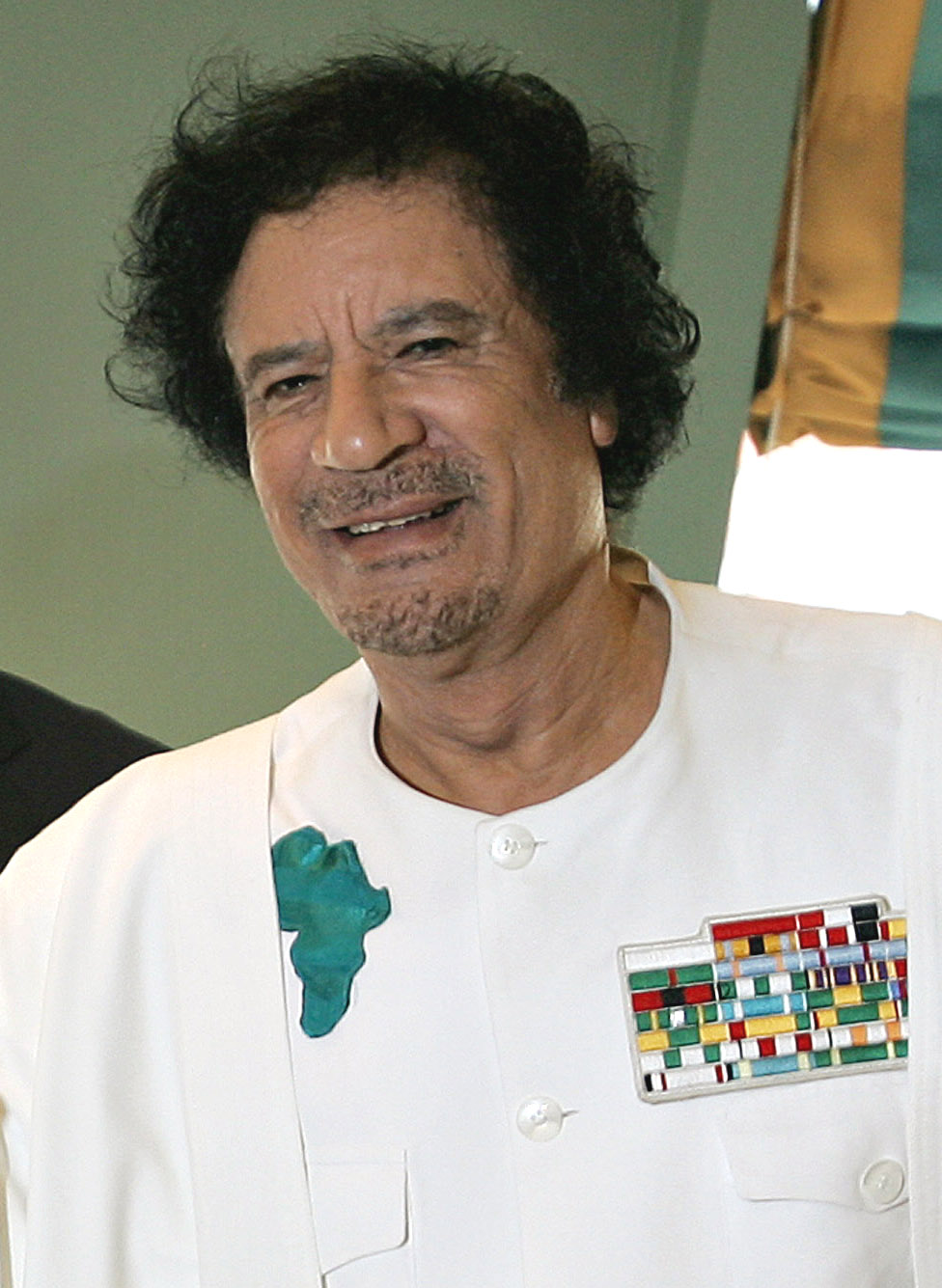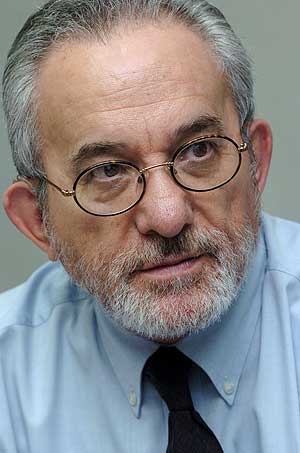As we are dealing with Swiss Law Enforcement on "Hannibal" Motassim Bilal Gaddafi and His Wife Alin Skaf/Aline Skaff, I thought I would share an interesting speech made by Hannibal's Father, Muammar Abu Minyar al-Gaddafi/al-Gathafi, about the UN Security Council and the illegality of International Criminal Courts and Tribunals. I have extracted only a few paragraphs from al-Gaddafi's full speech.
To read the complete text, go to http://www.algathafi.org/html-english/cat_01_04.htm
*
The international courts and tribunals are a feature of an international system that is based on selectivity and double standards. What these courts have in common is their lack of the legal conditions for the existence of any court.....
......In establishing the tribunals of Nuremburg and Tokyo in the wake of World War II, the Allies invoked only the legitimacy of the victors who were capable of imposing their terms on the vanquished. They created those tribunals in a manner that guarantees the condemnation of their enemies as criminals while absolving them of their own war crimes.....
....Those tribunals met none of the standards of justice in view of the following facts: They were created by the political leaders and military commanders of the occupation forces. Their judges were not impartial. They were themselves the opponents on the field of battle. In accordance with the recognized standards of justice, they were not qualified to play the role of a judge since they were party to the conflict.....
...The defendants before those tribunals were prisoners of war. Under international law, they could not be brought to trial.....
.....The Tokyo tribunal was created by a special order of General McArthur. That personal order established new, contrived crimes and offences that existed only in McArthur’s imagination. Needless to say, the court under that law victimized many defenseless Japanese........
.......the Tokyo Tribunal condemned a Japanese commander for what it considered the crimes of the soldiers under his command in the Philippines. He was sentenced to death despite the fact that it was not proven that he had given any orders. Indeed, he could not have known what had happened for the simple reason that he had fled the battle field.......
.......Those tribunals were a sham whose only purpose was to provide justification for the conduct of the Allies who exceeded the legitimate right to self defense. A proof of this is that unlike the other Allies, Russia, the country most devastated by the War, did not put any of the German military commanders in the part of Germany it occupied, on trial........
....The international criminal courts are illegal. So are their sentences. Their victims and their relatives are entitled to just restitution and reparations for the injustice visited upon them. They are entitled to demand rehabilitation. The events of World War II must be brought once again before impartial courts that would reconsider the conduct of the victors and the vanquished alike. The earlier tribunals did not prosecute the crimes committed by both parties. They were confined to the prosecution of the vanquished alone. More importantly, the crimes for which they were tried had not been established in a previous law. Therefore, those tribunals violate the legal rule “Nullum crimen, nulla poena sine lege”. (No persecution for a crime unless pursuant to a previous law establishing that crime)......
......The same applies to the International Criminal Tribunals for the Former Yugoslavia and Rwanda. They were both established by the Security Council. The legitimacy of the Council is dubious. It was created in the same manner, and under the same circumstances, in which the Nuremburg and Tokyo Tribunals were established. It is yet another one of the products of World War II. The victors created the Security Council as a tool to shape international relations in the manner they saw fit. It was not created by the independent will and free choice of the states of the world. ........
......The character of the council, and the tasks it currently discharges, are dubious because it represents only a minority. The states of the world did not take part in its creation. Therefore, it has no right to put their citizens on trial. Suffice it to recall that the international Court of Justice ruled that the Security Council had no jurisdiction over the Lockerbie question. Nevertheless, the council disregarded that ruling and continued to address the Lockerbie question without any international legal basis. At the same time, the Council did not address the Court’s ruling concerning the “Military and Paramilitary Activities in and against Nicaragua”.........
.....The current international courts and tribunals were created in the fashion of their antecedents. Their purpose is not to try all those who may have committed a crime, but to try the weaker, vanquished party alone......
The International Criminal Court (ICC)
The establishment of the ICC followed the same lines of the Military and Ad-Hoc International Criminal Tribunals. Although established by a treaty, its Statute was based on the rules governing the above-mentioned international tribunals and on the rules of the Nuremburg Trials. This inherent distortion has stripped it of its character as a court of law in the strict legal sense.
This is evident in the following:
The Statute of the ICC allows the Security Council to request it to halt the proceedings of any case brought before it. Even if the Council abandons it’s well known selectivity and double-standards in dealing with international peace and security, any relationship whatsoever it may have with the Court negates the independence of the ICC and strips it of its character as a court.....
.......the International Criminal Tribunal for the Former Yugoslavia...... That tribunal condemned the commanders of the Bosnian Serb Army and the Bosnian Croat Army without any evidence that they had given orders to commit the crimes of murder and torture for which they were condemned. Indeed, it was not proven that either of them was even in the theater of operations at the time of the commission of those crimes......
....a court that is subject to the influence of an international authority of dubious legitimacy such as the Security Council and that of the major powers cannot be a fair court. Even if it were established by the General Assembly of the UN, it would still lack legitimacy and legality. The General Assembly is made up of civil servants who represent their countries before the UN. They are not legislators. They have no right to legislate. The General Assembly of the UN deals with the political and diplomatic questions facing the world. It is not empowered to legislate or enact laws. Legislation is the exclusive right of the world’s parliaments or their representatives....
.....The international criminal courts and tribunals that the world has so far known remain a mere façade. Rather than promoting justice, they distort it.............
......The states of the world have yet to agree on a precise definition of the crime of aggression that would facilitate the determination of aggressors and those who exercise the legitimate right to self-defense. In addition, the concept of aggressive war remains ambiguous......
.....Despite its lack of legitimacy, and despite its nature as an “emergency” council, the Security Council continues to have the upper hand in shaping relations among states. Therefore, the ICC will remain, like its creator, an “emergency” court. It will also remain a façade that hides the ill intentions of the powerful states towards the weak ones. It will enable the powerful states to escape the authority of the court, if it can be said to have any real authority......
.......National courts will continue to be more credible than the international ones. Thanks to their legitimacy and independence, the public will continue to consider the sentences of national courts as fair and impartial. The principle of universal jurisdiction of national courts allows any state to bring the perpetrators of war crimes to justice before its courts, regardless of where those crimes were committed and regardless of the nationality of their perpetrators.......
.....International law has not matured yet. It is still of a customary nature that does not enjoy the unanimity of the world. However it develops, it will continue to be a law “among” states, not “above” them. National sovereignty of states over their territory and citizens remains the criterion for the interpretation and application of any international instrument......
Keep an English Eye on ....
Gaddafi wants 'his pound of flesh' - 29 July 2008 - www.worldradio.ch
As the diplomatic crisis between Libya and Switzerland drags on, the French foreign ministry headed by Bernard Kouchner, has warned Libya against any escalation. But will intervention by other nations help or hinder a resolution in Switzerland’s favour. WRS’s Pete Forster put this question to Dr George Joffe, a Middle East specialist at Cambridge University’s Centre of International Studies. -->
Bern banks on bilateral talks with Tripoli - 29 July 2008 - www.worldradio.ch
Bern says it is going to continue direct diplomatic discussions with Libya, without the help of a third country acting as a mediator. It had been suggested that France or Italy could help sort out the crisis, which was sparked by the arrest of Colonel Gaddafi’s son and daughter-in-law in Geneva earlier this month. Meanwhile Swiss Foreign Minister Micheline Calmy-Rey says two Swiss citizens detained in Libya are now being held in better conditions. The Swiss consulate in Tripoli has not been allowed to visit them, but their lawyer says they are in good health, physically and mentally. Libya says they are being held for suspected immigration offences.
Libya negotiations to remain bilateral - 28 July 2008 - www.Swissinfo.ch
Switzerland and Libya will continue negotiations to resolve the ongoing diplomatic crisis between the two countries without the assistance of a third-party mediator.
Geneva hospital provided Gaddafis with medical escort - 28 July 2008 - http://www.worldradio.ch/ It has emerged that when Hannibal Gaddafi and his wife left Geneva, they took two doctors from the city’s University Hospital with them. The hospital´s director said the medical repatriation was justified, as Hannibal´s wife was nine months’ pregnant. One of the doctors returned from Libya the following day; the other had to wait an extra day for a flight back to Switzerland. The Gaddafis had been staying at the Hotel President Wilson in Geneva, but left the country immediately after paying CHF500,000 bail.
























